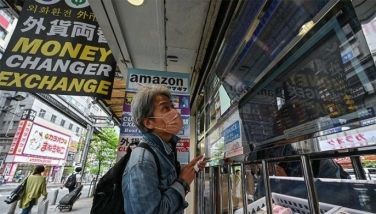Sugarmen laud NFA move to freeze auctions
November 8, 2000 | 12:00am
Sugar producers lauded yesterday the decision of the National Food Authority (NFA) to suspend the auctioning of sugar to traders and industrial users for the rest of the year.
The National Federation of Sugarcane Planters Inc. (NFSP) said such a move will help stabilize farmgate and consumer prices.
Enrique D. Rojas, NFSP president, said that NFA‘s move is timely because "we have been deeply concerned about the sudden downturn of raw sugar prices in the last three weeks."
Pressured by sugar producers, the NFA announced it will hold on to current stocks until the second quarter of 2001.
The current sugar stock of NFA is about 580,000 bags and unloading at this time will further erode sugar prices, NFSP said.
To ensure sugar prices are stable, sugar producers are scheduling a sugar summit to address declining millgate prices of raw sugar.
Sugar Regulatory Administration (SRA) Administrator Teodoro Alonso Admitted millgate prices of sugar are going south, especially with reports NFA is planning to import sugar again next year at low tariffs.
Millgate prices in Negros Occidental which produces 50 percent of total domestic supply, were pared down to about P750 per 50-kilogram bag last week form P770 as buyers/traders are holding back purchase orders in anticipation of getting lower prices.
As a result, sugar planters are increasingly getting nervous as sugar importation will boost local supply and in the process, soften prices.
The NFSP urged the SRA to head a sugar summit and convince government agencies such as the NFA, Department of Trade and Industry, Presidential Anti Organized Crime Task Force, Land Bank of the Philippines, sugar traders and other concerned sectors to participate and submit their recommendations.
Aside from importing sugar at low tariff or through the minimum access volume (MAV), additional importation with a higher tariff may be required to keep up with local demand. The MAV, which varies per product, is the least of imports the government allows to sensitive agricultural commodities.
"Sugar importation is necessary because our local production, even if it reaches the targeted production of 1.7 million metric tons, won‘t be enough to sustain domestic requirement" Alonso said earlier.
The National Federation of Sugarcane Planters Inc. (NFSP) said such a move will help stabilize farmgate and consumer prices.
Enrique D. Rojas, NFSP president, said that NFA‘s move is timely because "we have been deeply concerned about the sudden downturn of raw sugar prices in the last three weeks."
Pressured by sugar producers, the NFA announced it will hold on to current stocks until the second quarter of 2001.
The current sugar stock of NFA is about 580,000 bags and unloading at this time will further erode sugar prices, NFSP said.
To ensure sugar prices are stable, sugar producers are scheduling a sugar summit to address declining millgate prices of raw sugar.
Sugar Regulatory Administration (SRA) Administrator Teodoro Alonso Admitted millgate prices of sugar are going south, especially with reports NFA is planning to import sugar again next year at low tariffs.
Millgate prices in Negros Occidental which produces 50 percent of total domestic supply, were pared down to about P750 per 50-kilogram bag last week form P770 as buyers/traders are holding back purchase orders in anticipation of getting lower prices.
As a result, sugar planters are increasingly getting nervous as sugar importation will boost local supply and in the process, soften prices.
The NFSP urged the SRA to head a sugar summit and convince government agencies such as the NFA, Department of Trade and Industry, Presidential Anti Organized Crime Task Force, Land Bank of the Philippines, sugar traders and other concerned sectors to participate and submit their recommendations.
Aside from importing sugar at low tariff or through the minimum access volume (MAV), additional importation with a higher tariff may be required to keep up with local demand. The MAV, which varies per product, is the least of imports the government allows to sensitive agricultural commodities.
"Sugar importation is necessary because our local production, even if it reaches the targeted production of 1.7 million metric tons, won‘t be enough to sustain domestic requirement" Alonso said earlier.
BrandSpace Articles
<
>
- Latest
- Trending
Trending
Latest
Trending
Latest
Recommended





























